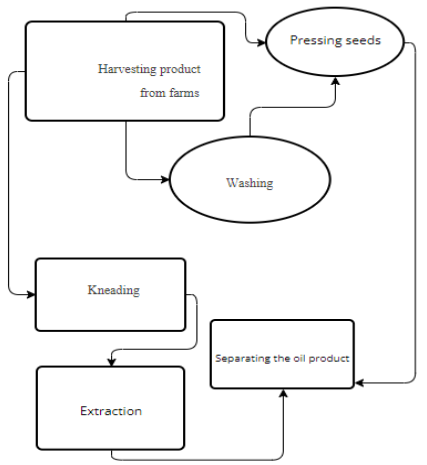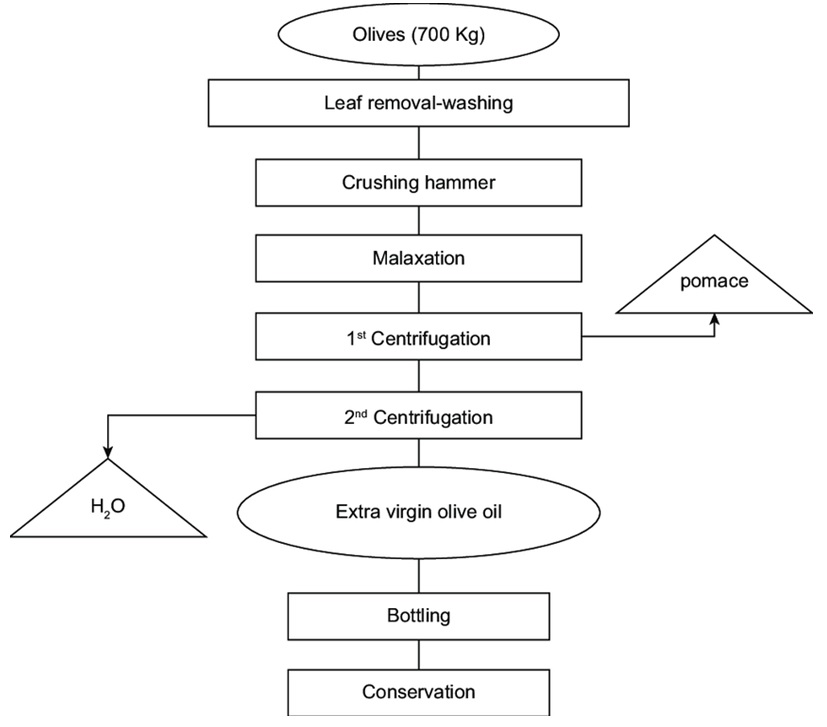Location
This area has a high level of consumer demand. Despite higher costs, this location will save you money in the long term. We plan on having our company in Barcelona, Spain. The city of location is Cardona hence our name Cardona oil ltd. We have sourced for a market in Venezuela. We are to transport our product from Cardona airport to CMDNA airport in Chacao, Venezuela. We expect to have our product arrive in Caracas within a span of 24 hours.
Production Process: Flowchart

Our company is owned by shareholders who are the farmers in Cardona town. They have planted olives which are key raw materials for olive oil. We harvest olives and store them in our production plant in Cardona town, which is the first step of the production process. The second process is washing the olives harvested to have a clean raw material for olive oil production. The third process is kneading, which is practically what we do to dough. After kneading, we extract oil from the dough made from kneading. The last step is separating the olive oil product from the excess waste product.
Resources, Workstations and Production Layout
Workstations:
- leaf-removers
- crushers
- malaxators
- configurations
Resources:
- machinery
- olive trees
- electricity
- bottles
- conservation equipment

Production Ratio Calculation
The company expects competition from Europe countries such as Greece and Italy. Our crucial trademark is freshening and quality. The USA and the world at large are critical consumers of olive oil. We are focused on the use of renewable energy to ensure we meet the carbon zero-emissions goal of 2050. We plan on recycling waste products to ensure we conserve the environment and save on production costs. Electricity for the manufacturing plant is an indirect cost. The electrical bill can be traced back to the facility; hence, it’s indirect.
- Direct costs = direct labor (€ 213) + direct cost of material (€220)+ manufacturing suppliers (€ 300) = € 733
- Indirect cost = Electricity (€ 100) + Water bills (€ 80) + Insurance costs (€ 320) = € 500
Daily:
- 2 production cycles
- 1 cycle = 900 liters of oil
- Daily: 900*2= 1800 liters
Materials allocations:
- One olive tree produces (initial) 20 liters of oil
- One olive oil tree produce (final)= 17 liters of oil
- Efficiency= 17/20*100= 85%
Shipping costs:
- € 120+ € 70= € 190
The company plan to implement two production cycles per day. Through one cycle, 900 liters of olive oil can be gained. Thus, each day is expected to produce 1800 liters of olive oil. From the material allocation perspective, one oil tree can, depending on its type can, grow from 17 to 20 liters of oil. Shipping will be executed through air transport. Road transport will be used to reach the customer’s premises.
PPC Process
It refers to the course or route that raw materials take in order to be transformed into a final product. Loading and Scheduling are involved with the preparation of workloads as well as the determination of the start and end dates for each process. Dispatching is the process of putting productive activities in motion by issuing orders and instructions in a predetermined time and sequence, as reflected in route sheets and schedule charts. It is from here that commands are issued. It is a control tool that provides an idea for dividing up, delaying, and correcting errors as work progresses. The purpose of the inspection is to determine the quality of the work process that has been completed. A detailed analysis is performed during the evaluation phase, and corrective efforts are conducted in the weaker areas.
Quality Control
Pre-Production Inspection (PPI) is performed before the start of the manufacturing process to determine the quantity and quality of raw materials and components, as well as whether they meet the appropriate product specifications. DPI, also known as DUPRO, is a quality control examination that takes place while a product is being manufactured. This stage is especially beneficial for products that are in continuous production and have stringent criteria, as well as when quality issues were discovered prior to manufacture during a previous PPI. Pre-shipment inspections (PSI) are an important step in the quality control process and a way to ensure that goods are in acceptable condition before they are transported. Inspections of container loading and unloading verify that your goods are loaded and discharged correctly.
Ensuring Sustainability
In today’s environment, lowering energy costs is a win-win situation. There appears to be little doubt that we are approaching “peak oil,” or the point at which half of the world’s known oil reserves have been depleted. Consume only the materials and resources required to complete the project. Although it may appear straightforward to us today, I believe we can all agree that in the past, our major goal was to lower production costs or time to market. When I met up with colleagues at conferences or trade exhibitions recently, one of the hot issues was how to limit the usage of “environmentally unfriendly” materials in manufacturing, as well as manufacturing process by-products.
Additional Factors
As a lean organization, we will focus on implementing sustainable operations as a part of our strategy. The first step is forming reliable alliances and establishing good relationships with partners. Another factor is the implementation the new technologies and advanced equipment. The last step is implementing regular checks helping to assess the plan compliance. Moreover, our company strives to comply with the Sustainable Development Goals’ ecological inquiries. These steps will help to ensure compliance with the long-term aims of stable eco-friendly growth of the company.